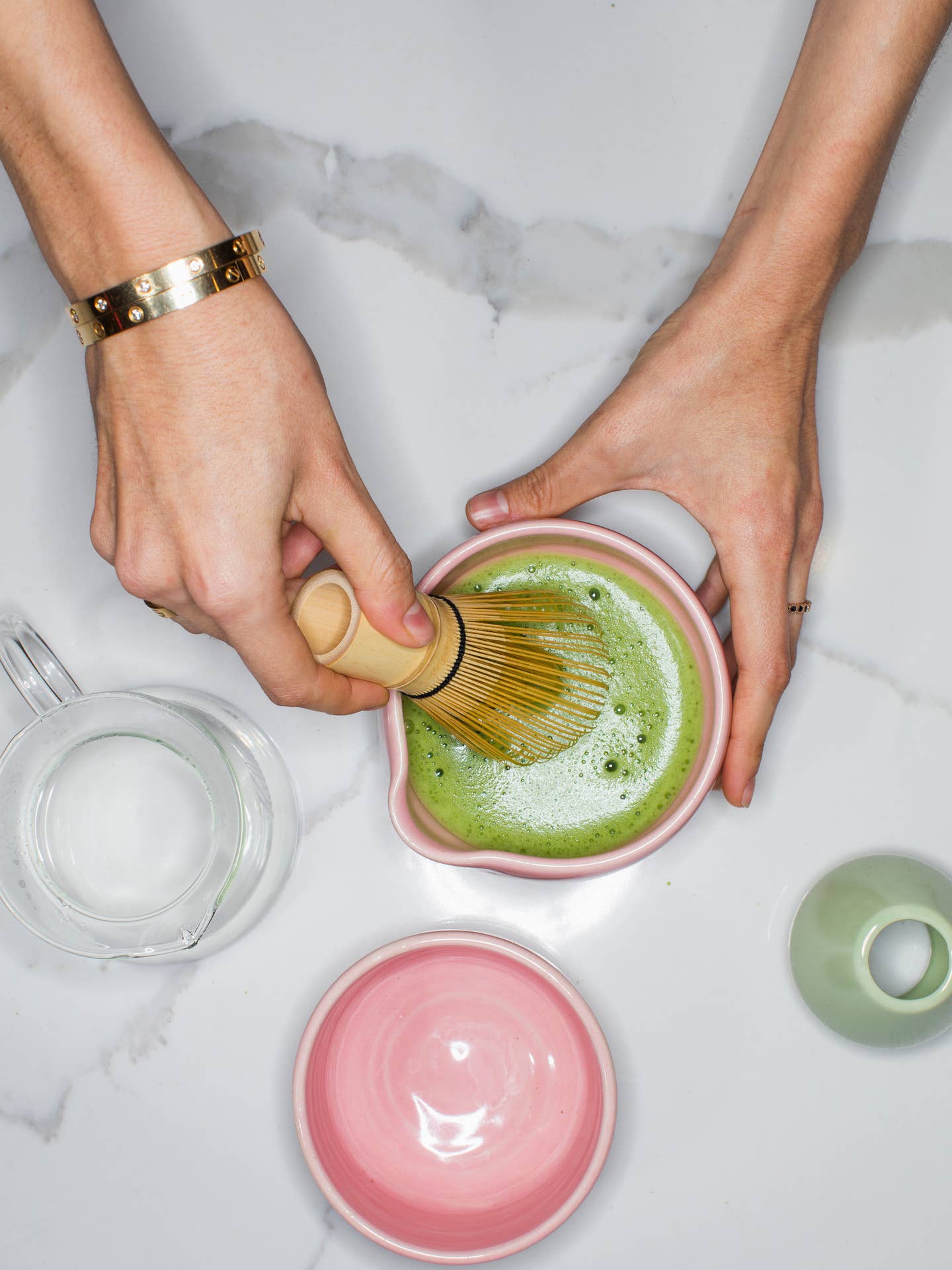
5 Health Benefits of Matcha and Why This Green Tea is Worth Sipping
Green tea has been consumed by millions of people around the world for thousands of years but is having a moment right now in the U.S. in the form of matcha, the name for green tea in a powdered form. It could be the vibrant green color (great on Instagram) or matcha's many health benefits: It boosts the body's natural weight-loss abilities and delivers caffeine-like energy without the crash. One thing that's for sure is the current wave of wellness-focused content is making matcha a superstar.
Matcha Near Me: Where to Find Tea, Powder, and Lattes
Matcha is not a new fad, since it's been around for almost 1,000 years. If you're just finding out about this popular powder, know that it's worth the splurge to buy a matcha dessert or beverage. My favorite based on taste and texture is Navitas Organics Matcha Powder, which comes in an easy-to-store pouch, and is available on Amazon for $16.
Some other matcha favorites: Buy your best friend a matcha sponge cake for her birthday online at Lady M, and even better, take her to a hip matcha cafe like Cha Cha Matcha, with locations in New York and Los Angeles. We recommend ordering the matcha soft serve ice cream with the lavender twist (see below). Visit the Matchaful Cafe on Canal Street in New York for tasty Matcha treats and purchase a ritual set for at-home tea preparations. But we're not going to lie, it could result in a pricey visit. (One pack of 100 grams, equal to 1 cup of the powder, is $79.) Here's why that price may not be so steep, considering all of the many health benefits of matcha.
Health Benefits of Matcha Tea
1. Full of Nutrients
Unlike the normal green tea package, like any Lipton product or loose leaves that you steep and then remove from the infused hot water, matcha comes in a powdered form made from the tea leaf itself. This creates a drink that is actually better for you and has a higher concentration of nutrients than when you steep tea from the leaf, which after all you don't ingest. One gram of matcha tea contains 27 mg of potassium for healthy nerve function, 4.2 mg of zinc to boost immunity, 3.5 mg of iron to increase energy, and 2.3 mg of magnesium for blood and nerve health. Matcha contains more than 50 percent of our daily intake of vitamin A, important for eye health, reproduction, and immunity.
2. Boosts Energy Naturally
Matcha delivers the same kick as caffeine, but without the jitters or anxious feeling because it has a balanced combination of caffeine and L-theanine, a natural amino acid found in plants that helps with relaxation without drowsiness. Some people also consume it when they are dealing with stress. And don’t worry about feeling too relaxed, the caffeine will help jump-start your day and the L-theanine will make you feel grounded. Generally, one scoop of matcha, 1 gram, equals the same caffeine in an espresso shot, or 35 mg of caffeine.
3. Boosts Natural Weight Loss
Matcha contains EGCG, or Epigallocatechin gallate, a powerful plant compound that has several known health benefits, including reducing inflammation and increasing CCK, or cholecystokinin, which is a hormone that makes you feel full. For best results, try to drink matcha between meals and you are likely to eat fewer calories when dinner time comes around.
4. Reduce the Risk of Cancer
Matcha powder contains the powerful catechin EGCG, described as a "chemoprevention," which is able to work against cancer cells as they form, according to a review study by MDPI Journals. The study found that the catechin has the ability to slow colon cancer cell growth. "EGCG is the most abundant and powerful antioxidant in green tea for cancer chemoprevention," researchers concluded.
5. High in Antioxidants
The catechins contained in matcha are natural chemical compounds found in the leaves of the plant. The longer you steep the tea, the more antioxidants you will receive in every sip. Why are antioxidants good for us? They help stabilize free radicals that are known to damage cells, lower your immune system and increase aging. Our tip: To avoid getting sick in the winter, try drinking more matcha.
What Does Matcha Taste Like?
Matcha is similar to green tea, but with an earthier taste: Something between wheatgrass and green vegetables, like cucumber. Matcha delivers a grassy aftertaste but in a good, healthy, clean way. It has a richer taste than normal green tea and blends well with lavender, jasmine, coconut, and other flavors. The powder is almost like a thickening agent when you add it to smoothies or yogurt.
Make These Vegan Matcha Recipes
Take matcha to another level with these easy, plant-based recipes.
- Glowing Green Smoothie
- Vegan Matcha Waffles with Coconut Whipped Cream
- Chocolate Matcha Energy Balls
- No-Bake Vegan and Gluten-Free Matcha Cookie
Bottom Line: Add Matcha to Your Diet to Boost Overall Health.
Matcha green tea has both energizing and calming effects and is full of essential nutrients and minerals that help boost immunity, natural weight loss, energy. It helps fight diseases, including cancers due to its high levels of antioxidants.
For more great expert health advice, check out The Beet's Ask the Expert articles.
More From The Beet






